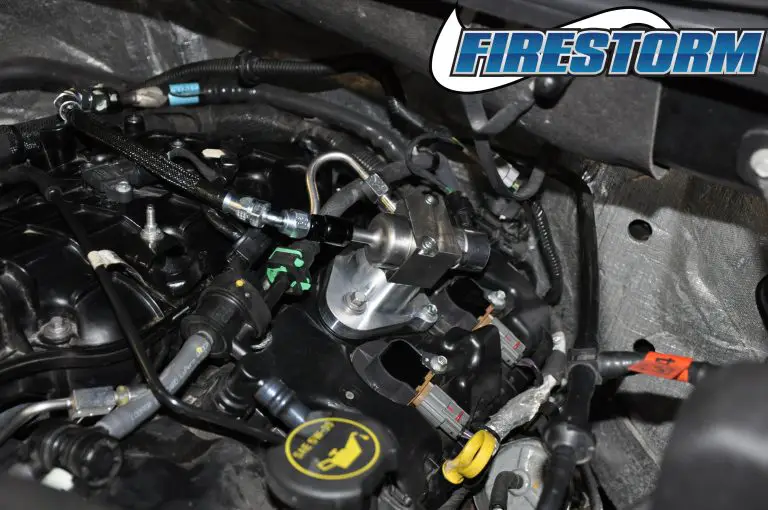What Oil Does 3.5 Ecoboost Take
Last Updated on by David Jon
In the pursuit of optimal vehicle performance and maintenance, the right engine oil plays a vital role. Focused on the popular 3.5 Ecoboost engine found in many Ford models, this article aims to shed light on the specific type of oil required. Noted for its fuel efficiency and powerful performance, the 3.5 Ecoboost engine can benefit significantly from the correct lubrication, enhancing its longevity and ensuring it continues to deliver a smooth drive. Whether you’re a car enthusiast or merely a user striving for seamless operation, this must-read piece will provide valuable insights into the appropriate oil for this engine.

Understanding Ford’s 3.5 Ecoboost Engine
Brief History of the 3.5 Ecoboost Engine
The 3.5 Ecoboost engine was successfully released by Ford in 2009. It is part of Ford’s strategy to gradually decrease engine capacity while boosting performance, and this is achieved by incorporating turbocharging and direct fuel injection technologies. Its design and execution have made the 3.5 Ecoboost engine a popular choice in several flagship Ford vehicles over the last decade.
Key Specifications and Features of 3.5 Ecoboost Engine
This engine is famous for its harmonious blend of power and fuel efficiency. It offers twin-turbocharged, direct-injection gasoline engines and is capable of delivering the performance of a larger engine with the fuel efficiency of a smaller one. As of its specifications, the standard equipped 3.5 EcoBoost engine produces up to 375 horsepower and 470 lb-ft of torque.
Common Applications of the 3.5 Ecoboost Engine
The 3.5 EcoBoost engine is commonly used in a variety of Ford’s top-selling vehicles such as the F-150, Expedition, and Lincoln Navigator. Its outstanding performance and energy efficiency have made it a suitable choice for large vehicles and heavy-duty applications.
Importance of Proper Oil for Ecoboost Engines
Role of Oil in an Engine
The primary role of oil in an engine is to minimize friction among moving parts. By creating a layer of lubrication between these parts, it helps prevent wear and damage. Additionally, oil plays a crucial role in cooling engine components and removing dirt and debris.
How the Right Oil Maximizes Engine Performance
Choosing the right oil is critical to maximizing engine performance. Suitable oil for your engine enables smoother operations and reduces the urgency of engine maintenance. It enhances the lifespan of the engine and improves fuel efficiency.
Potential Risks of Using the Wrong Engine Oil
Choosing the wrong engine oil could lead to various engine issues. These can range from decreased gas mileage and performance to severe problems such as engine overheating, potential failure or total engine seizure.
Recommended Oil Types for 3.5 Ecoboost
Ford’s Official Oil Recommendations
Ford officially recommends using full synthetic or semi-synthetic oil for the 3.5 Ecoboost engine. Ideally, the oil should conform to the American Petroleum Institute’s ratings of “SN” for petrol engines.
Best Brands for 3.5 Ecoboost Oil
Motorcraft, Valvoline, and Castrol are generally accepted as the best oil brands for the 3.5 EcoBoost engine. They produce high-quality and reliable oils, which meet or exceed the specifications recommended by Ford.
Full Synthetic, Semi-synthetic, or Mineral: Which is Best?
For the 3.5 Ecoboost engine, full synthetic oil is typically the best choice. This oil type provides superior protection, improves engine performance, and extends oil change intervals. While semi-synthetic and mineral oils may be used, they do not offer the same overall benefits as full synthetic oil.
Viscosity Ratings and their Importance
Explaining Oil Viscosity
Viscosity refers to the thickness of the oil and its resistance to flow. Oil with a higher viscosity is thicker and flows more slowly compared to less viscous oil. The correct oil viscosity is essential for providing adequate engine lubrication.
Suitable Viscosity Ratings for 3.5 Ecoboost
For the 3.5 Ecoboost engine, oils with viscosity grades of 5W-30 or 5W-20 are most suitable. Ford recommends 5W-30 viscosity grade for some Ecoboost models, while others may need 5W-20 viscosity grade. Always refer to your vehicle’s owner’s manual for the correct viscosity grade.
How Temperature Affects Viscosity Choice
The choice of oil viscosity is affected significantly by the operating temperature of the engine. In colder temperatures, lower viscosity oil (like 5W-20) is preferred because it flows more easily and provides faster protection. On the other hand, in hotter temperatures, a higher viscosity oil (like 5W-30) is recommended to maintain proper lubrication.

Additives in Engine Oil and their Benefits
Common Additives in Engine Oil
Engine oils have a mix of various additives to improve their properties, including detergents, dispersants, antioxidants, and antiwear agents. These additives play an essential part in enhancing the performance of the oil.
How Additives Enhance Oil Performance
Additives in oil play a significant role in enhancing oil performance. For instance, detergents help keep the engine clean by minimizing deposit build-up, whereas antioxidants reduce oil oxidation, prolonging its lifespan.
Special Additives for Turbocharged Engines like 3.5 Ecoboost
Turbocharged engines like the 3.5 Ecoboost require oils with specific additives such as friction modifiers and viscosity index improvers. These additives improve lubrication, minimize wear in extreme conditions, and help the oil to maintain its viscosity under high operating temperatures.
Oil Change Intervals for 3.5 Ecoboost
Standard Oil Change Frequency
The general recommendation is to change the oil in a 3.5 Ecoboost engine every 7,500 to 10,000 miles under normal driving conditions. However, in severe service conditions such as extensive idling, towing heavy loads, or operating in extreme temperatures, more frequent oil changes may be necessary.
Factors that May Require More Frequent Oil Changes
Factors such as using the vehicle for towing, regular short trips (especially in cold weather), extensive idling or driving in dusty conditions may necessitate more frequent oil changes.
Understanding Oil Life Monitoring Systems
Ford vehicles equipped with a 3.5 Ecoboost engine typically include an intelligent oil life monitor system. This system analyzes your vehicle’s usage and operating conditions to determine when an oil change is needed accurately. By keeping track of these alerts, you can ensure your vehicle receives timely oil changes.
Steps for Changing 3.5 Ecoboost Oil
Materials and Tools Needed
The tools needed to perform an oil change on a 3.5 Ecoboost engine include oil, an oil filter, an oil filter wrench, a socket set, a jack stand, and a catch pan for the old oil.
Safety Measures to Observe
Always remember to observe safety measures when changing your engine oil. Ensure the vehicle is securely supported on jack stands, and the engine is cool to avoid burns from hot oil.
Step by Step Guide to Changing Oil
To change the oil, start by prepping your workspace and gathering all necessary tools and materials. Next, lift your car using the jack stand. Remove the oil plug and drain the old oil. Replace the drain plug, then replace the old oil filter with a new one. Finally, refill the engine with new oil.
Signs that Your 3.5 Ecoboost Needs an Oil Change
Engine Noise and Knocking
A common sign that your 3.5 Ecoboost engine needs an oil change is increased engine noise or knocking. This is often due to reduced lubrication within the engine’s components.
Exhaust Smoke
Excessive exhaust smoke might be a sign that your 3.5 Ecoboost needs an oil change. This could be due to oil contamination or oil burning in the combustion chamber.
Decreased Engine Performance
Decreased engine performance in terms of acceleration or fuel efficiency can also indicate an immediate need for an oil change.
Oil Texture and Color
If the oil appears black or has a gritty texture when checked, it’s typically a clear sign that an oil change is needed.
Professional Oil Change Vs. DIY
Cost Comparison
Getting oil changed professionally typically costs more than doing it yourself due to labor costs. However, doing it yourself requires investments in tools and equipment.
Time Investment
While changing your engine oil at a service station might take less time than a DIY oil change, it is often easier to accommodate the latter into your schedule.
Expertise and Skill Requirements
Changing your own oil requires a certain level of mechanical skill and knowledge. If you lack confidence in your ability to correctly perform an oil change, it might be better to opt for professional service to avoid potential engine damage.
Conclusion: Keeping Your 3.5 Ecoboost in Prime Condition
Importance of Regular Maintenance
Regular maintenance, including routine oil changes, ensures that your 3.5 Ecoboost engine performs as expected while prolonging its lifespan. This will also help to maintain the value of your vehicle over time.
Long-Term Financial Benefits of Proper Maintenance
While regular oil changes do entail some cost, they can genuinely pay off in the long run by avoiding expensive engine repairs and maximizing fuel efficiency.
Maximizing the Lifespan of Your 3.5 Ecoboost
By following Ford’s recommendations on oil type, viscosity, and oil change intervals, you can maximize the lifespan of your 3.5 Ecoboost engine while also ensuring it delivers its best performance. Regular maintenance is a fundamental part of this process and will help protect your investment in your vehicle.







